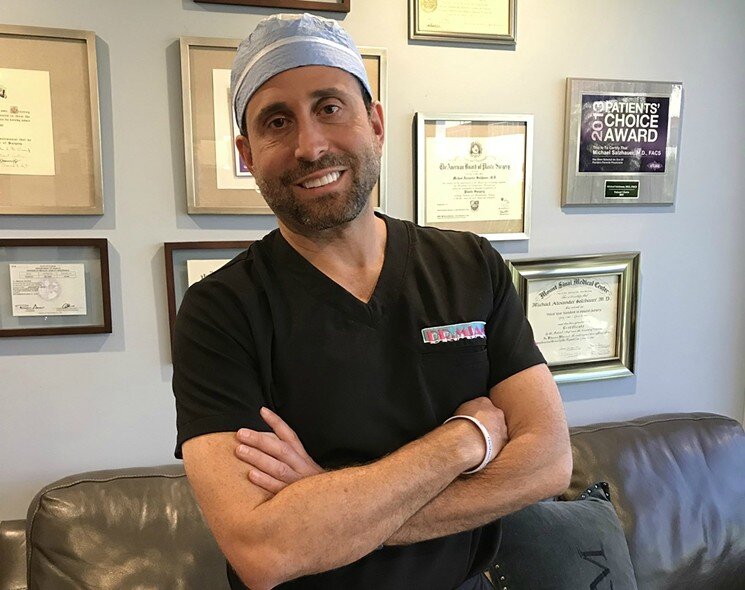They Call Me Dr. Miami: Portrait of a plastic surgeon who'll never need a grandiosity transplant
By Linda Barnard
Rating: B
With the postponement of this year’s Hot Docs International Film Festival because of the coronavirus crisis, the Canadian Broadcast Corporation is airing a selection of films that would have been screened at this year’s festival
Dr. Michael Salzhauer, the self-billed “best plastic surgeon in the universe,” rules from a golden throne in his Miami office, his empire built on breast implants, mommy makeovers and pneumatic rear ends created by Brazilian Butt Lifts, all livestreamed on Snapchat in bloody real time.
Dr. Michael Salzhauer, the self-billed “best plastic surgeon in the universe.”
He’s the star of frenetic videos, rhyming about how he’ll “create the baddest bitches,” with his flashing scalpel, his grin showing off blindingly white veneers.
Salzhauer is also an Orthodox Jew who keeps kosher and observes the Sabbath, a husband and father of five, including two daughters. Low-key and soft-spoken when not looking into a smartphone, he admits he’s concerned about disappointing God. He’s also worried about losing a patient. Although when that possibility presents itself, his reaction is tellingly more about how it could reflect on him.
In the documentary They Call Me Dr. Miami, Canadian filmmaker Jean-Simon Chartier (Playing Hard) follows Salzhauer from operating room to temple without judgment, holding up his two sides for contemplation.
With “will the real Dr. Salzhauer please stand up?” Chartier invites us to look a little deeper.
But is there much depth there?
His family is deeply religious. Eva, Salzhauer’s wife of 20 years, dresses modestly and has the occasional squirt of Botox. She believes insecurity is what drives her husband to find approval on the web while constantly tweaking his own looks.
His teenage daughter Aleah is less accommodating. Our bodies belong to God, she says, and tinkering with them isn’t part of the plan.
With an introduction to medicine through watching M*A*S*H* as a kid (where the operating room doubled as a stand-up comedy venue), Salzhauer’s practice is also geared to entertainment. Proud of being name-checked by hip-hop artists, he’s always looking for ways to add to the millions of followers who watch him pump harvested fat into posteriors covered with Magic Marker lines to guide him. The patients sleep on while their backsides take center stage.
They come from the same social media arena Salzhauer feeds, their fixation on the 2020 version of the perfect body reflected to infinity through bathroom mirror selfies.
Salzhauer has banded with other social media plastic surgeons to further their brands, Dr. Bae, Dr. DrBfixin and Toronto’s Dr. 6ix. But as one surgeon who doesn’t subscribe to the Miami method observes, does operating-room clowning inspire confidence in a physician?
Chartier’s documentary moves quickly. Good thing. The 77-minute runtime is about all I could take of self-absorbed Dr. Miami and the sexist atmosphere that surrounds his work. Yet the dichotomy between the public and private man is fascinating. His patients declare “my body, my choice,” a whole other ethical debate that They Call Me Dr. Miami is sure to spark.
There’s also the unanswered question of whether any of these enhancements can be reversed. Jayne Mansfield was among the curvy women who set the voluptuous standard for female beauty in the 1950s and early ’60s. And then came Twiggy.
And if the sexism around the creation of an amped-up behind rankles, the look on a male patient’s face when Salzhauer explains a penis-enlargement procedure in graphic detail almost makes up for it.
They Call Me Dr. Miami. Directed by Jean-Simon Chartier: Airs May 14 on CBC and CBC Gem at 8 p.m.; 9 p.m. on the Documentary Channel


